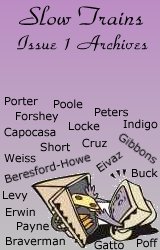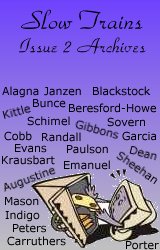
Hartsburg
by Dave Gregg
This is a story about a location in its sunset. In every sunset there are regrets and
nostalgic pangs, and the inner city of Hartsburg is no exception. Thousands of people have
lived here, worked here, loved, and died here. Now the area is in its last days. This is the
story.
Hartsburg has entered her death throes. The good businessmen have fled, a great Arabic
caravan of carpet dealers, jewelers, appliance salesmen and clothing merchants. They have
retreated to malls, where customers stroll through climate-controlled environs sheltered from
such nuisances as atmosphere. The new breed of consumer can spend an entire day in the
sanctuary of a shopping center, and will. The handful of rebellious retailers who resist this
exodus falter, for there are no patrons in downtown Hartsburg. People may work and live downtown,
but they don’t shop here. Even the shadows catch the bus home.
At the center of downtown is an aging single room occupancy dwelling known to police
dispatchers as the “Crazy Clark.” Omar Clark bought the brick edifice thirty years ago, and to
the best of anyone’s knowledge, has never exited the building. There are seventeen tenants
registered at the hotel, some of them in transit, but all of them desirous of another life.
Across the street from the Clark is Dick’s Pawn, the busiest location downtown after the
mortuary. Richard Evans has policed the counter of his shop for nearly twenty-five years, and
if it exists, he has bought it or sold it. The walls of the dank shop are lined with ancient
guitars and squeaky violins, the dusty floor littered with used office equipment, battered
sewing machines, and vacuum cleaners. Boxes of aging records and dusty music cassettes occupy
every corner of the establishment. The oldest item in stock, and the only living one, is
Stewart, a black raven. Dick traded a ten dollar ticket for Stewart six years ago, and is
still waiting for its redemption.
At the corner of First and Market is the Tower Bijou, a crumbling relic from the black and
white film era. The theater has existed for nearly sixty-two years, built in the womb of
Hartburg's boom, and abandoned in the explosion of triplex theaters that appeared in the
suburbs. The Tower has not screened a first run film in over fifteen years. It is a showcase
for forgotten cinema.
The interior of the theater is adorned in red velvet, lined with thick tapestry from Paris,
and crowned with an ornate Greek dome that inveigles the exterior light between screenings.
The seats are in horrific condition, party to multiple butts, and prey to the juvenile
meanderings of bored audiences. The theater is for sale; the only person who cares is Marty
Sullivan Ross.
Marty is the ticket taker and popcorn maker at the Tower Bijou. He is known as “ding-ding,”
a handle derived from his fighting days. Marty won seventy-two bouts as a middleweight
pugilist. Unfortunately he lost just as many, and suffers severe gaps in his memory. He tends
to swing at ringing objects, and often falls down at the count of three.
Beneath the marquee of the movie house, Marty smokes a cigarette he purloined from Doctor
Danny. Doctor Danny is on his way to work at the American Thrift Store on Compton Street. At
this establishment he sorts used clothing and chases wrinkled bag ladies who relish ripping
the colored labels off the merchandise. Danny received his nickname by virtue of his skills
as a tailor, which he honed with many years of service at the local dress shops that formerly
lined the streets of downtown Hartsburg. The doctor is an expert on Hartsburg, since he claims
he personally built it, but the singular talent he possesses beyond bragging is the ability to
size a human being in less than eight seconds. He does not guess, he does not speculate or
estimate -- he knows. Before you can utter a syllable, he will state your waistline to the
nearest half-inch, your collar size, and your shoe width. One of his pastimes is to prowl the
creaking wood floors of his employer, gauging potential customers.
“Six!” he shouts to a woman in a faded red sweater.
“Fifteen!” he bellows at an off-duty cop looking for cheap work shoes.
“Never!” he screams at the obese lady fondling the lingerie.
Doctor Dan works the morning shift at the American Thrift Store. At four in the afternoon
he will drop his tape and store his pins and catch the Number Six bus for his garage
apartment in the suburbs.
The driver of the Number Six bus is a black man named Henry Morgan, an employee of the
transit company for twenty-two years, and a frequent visitor to the downtown area, for both work
and pleasure. He enjoys frequenting the card parlors in the area, and often he will double
his paycheck in a few hours.
There is a man he loses to consistently. His name is Aaron, an old man in his seventies,
crippled with arthritis and in dire need of company. Henry provides it with a few hours of
poker once a week at the Oasis card room.
He will deal seven cards to the old man, and the conversation is conducted softly in the
smoky stench of the aging parlor. In his day, Aaron could play some cards -- now he has very
little to gamble, and he suspects many of the pots he wins are due more to Henry’s generosity
than his own declining skills. After three hours, the younger man excuses himself and returns
to his route. Aaron thanks him, and wishes aloud for another match. Henry smiles and laughs
at his father.
The guilt he bears over his father’s health and loneliness peak as Henry wheels the bus
by the Clark Hotel, where Aaron has lived for nearly twenty years. Henry has never been
inside the hotel, preferring to meet his father at the card parlor. Henry is not afraid of
the hotel, not in the physical sense, for Henry is a husky, powerfully constructed man. Rather
he fears an emotional danger, the danger of confronting a father without a handful of aces
and treys in his hand. The fear of trying to connect with someone vanished -- the fear of
trying to resurrect a bond once powerfully good and now horribly meager.
Several years ago Henry bought his father a pet for companionship. It was a bird, a raven
crow, which the hotel management did not appreciate and immediately evicted.
Naturally, Stewart has no recollection of this as he stares out the window of the pawnshop
with his raven-eyes into the faces of the people on Bus Number Six.
©2001 by Dave Gregg




